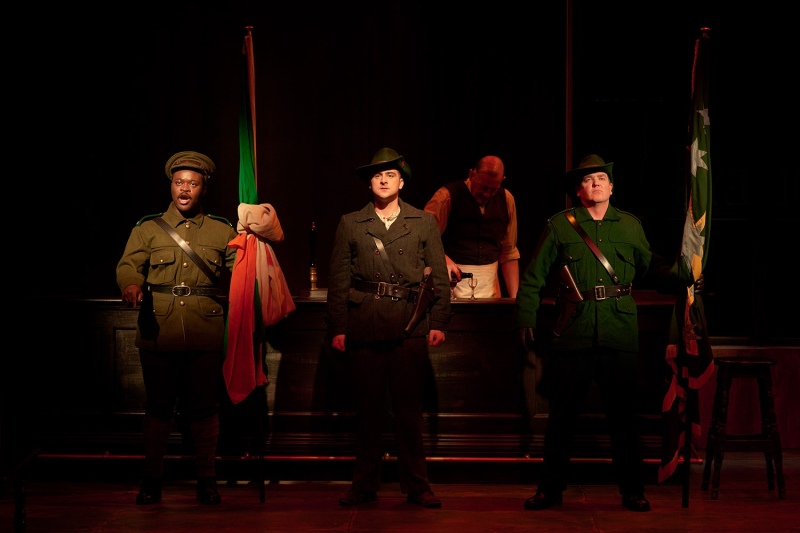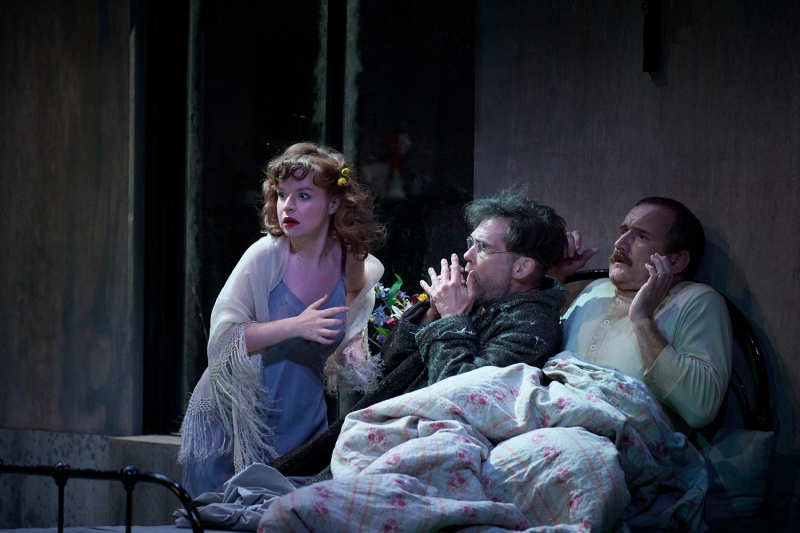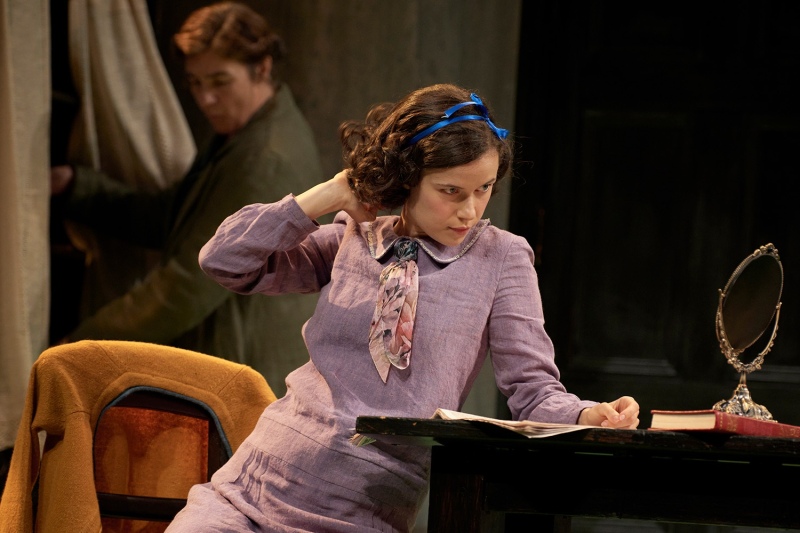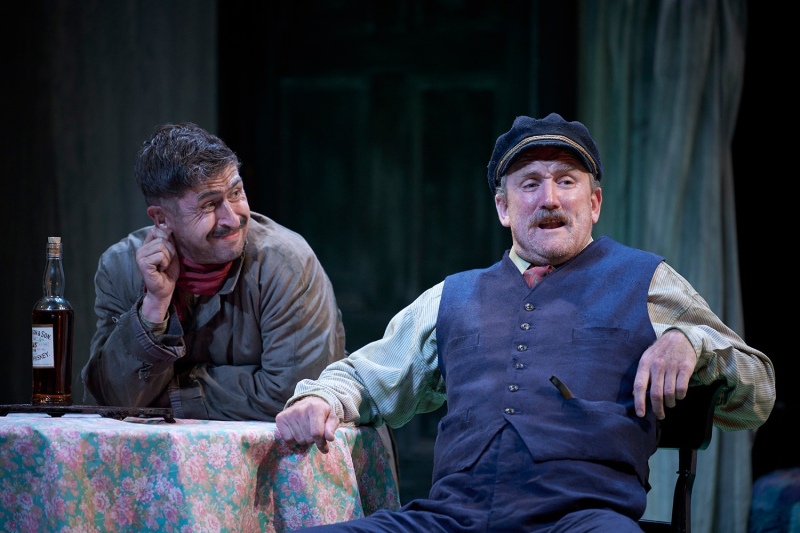 Some years back we travelled to York for another theatre triple bill, where the Globe was touring all three of Shakespeare's plays about Henry VI. Both trilogies are similar in dealing with historical events and not having been written as a trilogy, but in other respects they diverge markedly. Shakespeare was writing more than a hundred years after the events he describes, while O'Casey was writing almost contemporaneously with the turmoil of independent Ireland's birth (The Shadow of a Gunman premiered towards the end of the Civil War, with Juno and the Paycock hitting the stage in 1924 and The Plough and the Stars marking the Easter Rising's tenth anniversary in 1926). And crucially, while Shakespeare's focus is on those who directed the historical struggles of Henry VI's reign, O'Casey is looking at the ordinary people who are caught up in the conflicts swirling around them, sometimes as minor participants but more often as bystanders or people trying to get on with their lives in a time of chaos. O'Casey is looking in particular at the working class people inhabiting the grotty tenements of central Dublin (though The Shadow of a Gunman felt like it might be looking at a slightly more prosperous strata of boarding house residents). His sympathy for his subjects means that he is ambivalent or hostile to the supposedly heroic struggles wrecking their lives (the 1916 Rising is presented as a pointless bloodbath directed by a raving madman while the Civil War comes across as little more than a tit-for-tat gang war).
Some years back we travelled to York for another theatre triple bill, where the Globe was touring all three of Shakespeare's plays about Henry VI. Both trilogies are similar in dealing with historical events and not having been written as a trilogy, but in other respects they diverge markedly. Shakespeare was writing more than a hundred years after the events he describes, while O'Casey was writing almost contemporaneously with the turmoil of independent Ireland's birth (The Shadow of a Gunman premiered towards the end of the Civil War, with Juno and the Paycock hitting the stage in 1924 and The Plough and the Stars marking the Easter Rising's tenth anniversary in 1926). And crucially, while Shakespeare's focus is on those who directed the historical struggles of Henry VI's reign, O'Casey is looking at the ordinary people who are caught up in the conflicts swirling around them, sometimes as minor participants but more often as bystanders or people trying to get on with their lives in a time of chaos. O'Casey is looking in particular at the working class people inhabiting the grotty tenements of central Dublin (though The Shadow of a Gunman felt like it might be looking at a slightly more prosperous strata of boarding house residents). His sympathy for his subjects means that he is ambivalent or hostile to the supposedly heroic struggles wrecking their lives (the 1916 Rising is presented as a pointless bloodbath directed by a raving madman while the Civil War comes across as little more than a tit-for-tat gang war).
What is stylistically strange about these plays is the way they mix tragedy and comedy, with scenes of great pathos preceded or followed by chortlesome drunken buffoonery. These are the only O'Casey plays I have any familiarity with, but awkward juxtapositions of laughs and tears is for me almost the defining thing of his stagecraft. And it's not easy to stage successfully. Back in the 1990s I saw another production of Juno and the Paycock, which played up the laughs so much that the moments of tragedy were like awkward interludes to be run through as quickly as possible so that the actors could get back to the laughs. In the Druid production however, the direction of Garry Hynes does not shy away from the sense of tragedy, with the final scene in Juno not being a return to roffles but empty laughter as the hangman places the noose.
 One other point of similarity with the Shakespeare plays strikes me, this being the historical resonances of their staging. One of the major characters in the Henry VI plays found himself executed at York, his head stuck on a spike outside the walls near to where we were staying (it had been removed by the time of our visit). With the O'Casey plays the historical resonance comes more from seeing them performed in the theatre they had originally been staged in, as their first stagings had themselves been historical events, particularly for The Plough and the Stars. Its first performance in 1926, the tenth anniversary year of the Easter Rising, apparently went well, but on subsequent nights increasing numbers of Republicans appeared in the audience, making their displeasure at its non-observance of nationalist pieties known. On the fourth night, the audience was packed with Republican malcontents, including many who had lost relatives in the 1916 Rising. They progressed from hissing to full-blown rioting in the second act, which sees a prostitute interacting with various members of the cast in a pub while an unnamed off-stage orator delivers some of the more deranged lines from speeches by Patrick Pearse (the future leader of the Rising and still a hero to many); the Abbey's director, W. B. Yeats, addressed the crowd, saying "You have disgraced yourselves again" (a reference to the outrage that greeted The Playboy of the Western World in 1907).
One other point of similarity with the Shakespeare plays strikes me, this being the historical resonances of their staging. One of the major characters in the Henry VI plays found himself executed at York, his head stuck on a spike outside the walls near to where we were staying (it had been removed by the time of our visit). With the O'Casey plays the historical resonance comes more from seeing them performed in the theatre they had originally been staged in, as their first stagings had themselves been historical events, particularly for The Plough and the Stars. Its first performance in 1926, the tenth anniversary year of the Easter Rising, apparently went well, but on subsequent nights increasing numbers of Republicans appeared in the audience, making their displeasure at its non-observance of nationalist pieties known. On the fourth night, the audience was packed with Republican malcontents, including many who had lost relatives in the 1916 Rising. They progressed from hissing to full-blown rioting in the second act, which sees a prostitute interacting with various members of the cast in a pub while an unnamed off-stage orator delivers some of the more deranged lines from speeches by Patrick Pearse (the future leader of the Rising and still a hero to many); the Abbey's director, W. B. Yeats, addressed the crowd, saying "You have disgraced yourselves again" (a reference to the outrage that greeted The Playboy of the Western World in 1907).
One final thing struck me about the three plays. O'Casey was a socialist, but there is something strange about the way he portrays his working class subjects. The women are generally presented favourably, holding down jobs and keeping families together. But the men are typically a bunch of drunken wasters. You could argue that in an oppressive capitalist society drunken fecklessness is a way of striking back against the man, but when it leads to the further impoverishment of your nearest and dearest it has elements of cutting off your nose to strike your face. And even if you were to imagine that somehow 1920s Ireland had seen a socialist revolution, it is very hard to see the men of O'Casey's plays working hard to build the wonderful new society of tomorrow. More likely an Irish Stalin would have sent all the tenement dwellers off to the Gulag (i.e. Longford) and created a new proletariat out of the industrious sons of our peasantry.
images
All photographs by Ros Kavanagh
Gabriel Adewusi, Liam Heslin, Sean Kearns and Garrett Lombard in The Plough and the Stars (Druid)
Caitríona Ennis, Marty Rea, and Rory Nolan and in The Shadow of a Gunman (Druid)
Zara Devlin in Juno and the Paycock (Druid)
Aaron Monaghan and Rory Nolan in Juno and the Paycock (Druid)


No comments:
Post a Comment